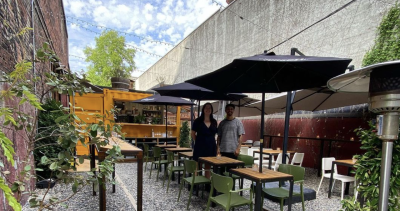After lifting minimum wage, NDP government prepares to consult public about reducing poverty
The B.C. NDP government hopes to have a poverty-reduction strategy in place by next year.
That’s according to Social Development and Poverty Reduction Minister Shane Simpson.
At this month's Vancouver Pride parade, Simpson told the Straight that the province has had "flat wage growth" for well over a decade.
He also said that about 500,000 British Columbians are living in poverty—and they’re not all on income assistance or disability benefits.
“Half of those people are the working poor,” Simpson stated. “They’ve got a full-time paycheque coming into the house.”
The government plans to address this by increasing the minimum wage in the hope that it will encourage employers to raise their workers’ pay.
“Others have taken the trickle-down approach to economic benefits being distributed,” Simpson noted, referring to the Gordon Campbell government’s decision to cut everyone’s income tax by 25 percent when it took power in 2001. “We’re going to push it from the bottom up.”
On August 15, Premier John Horgan announced that the minimum wage would increase by 50 cents an hour next month to $11.35 per hour.
He's also promised to boost it to $15 per hour by the end of the NDP government's first term in office.
One of the Horgan government’s earliest moves was increasing income-assistance rates by $100 per month.
Meanwhile, Simpson said there will soon be a public-consultation process in advance of introducing legislation on a poverty-reduction strategy.
The objective, according to Simpson, is to involve all ministries that can play a role, including those that oversee housing, childcare, income assistance, and education.
“We’ll bring them all together and, hopefully, be able to develop some strategies working with people in the community to start to break the cycle of poverty that captures people and captures families,” he said. “It’s incredibly hard for them to break that. It tends to go on for generations.”
Simpson stressed the importance of providing meaningful opportunities for poor people to participate in government consultations.
“We’re going to craft a way to do that,” Simpson promised.
He also said that the NDP government is committed to creating and measuring the results of a basic-income pilot project in B.C.
The minister suggested it might take three years to generate sufficient data for the government to draw conclusions.
There’s a similar pilot under way in Ontario. But one of the challenges is how to deal with public pensions, which fall under federal jurisdiction.
Advocates of a basic-income guarantee say it will provide everyone with sufficient money to meet basic needs and live in dignity, regardless of their employment status.
“Some people are quite supportive of it, others are a little more skeptical about whether it can work,” Simpson said. “I’m not certain one way or the other, but I think it’s worth a look.”
When he was an opposition MLA, Simpson often made the case for a provincial poverty-reduction plan.
His private member's bill on this issue in 2011 called for a minister responsible for poverty reduction to publish an annual report detailing the state of poverty in B.C.
In addition, the bill called for independent comment from an advisory committee, and reporting on the progress toward implementing a strategy, the attainment of goals and specific objectives and performance measures, and recommendations to improve the effectiveness of the strategy.
It also included a section requiring consultation with B.C. residents living in poverty, as well as with other levels of government, First Nations, nonprofit groups, the business community, academics, and the trade-union community.















Comments